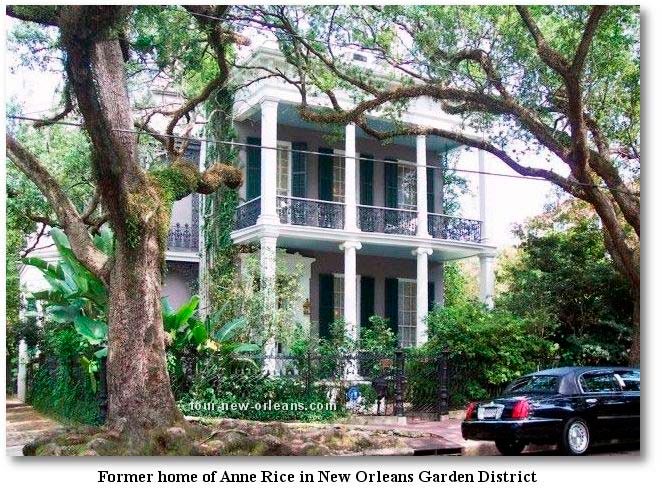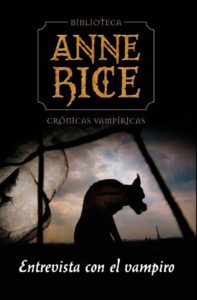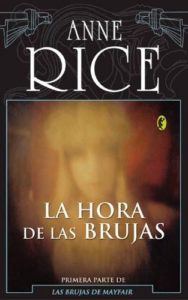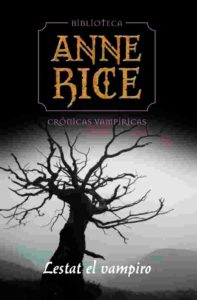(English version of this interview below spanish one) Anne Rice es una personalidad controvertida, un fenómeno de masas cuyo talento literario es innegable, y cuya visión del terror resulta, cuanto menos, revolucionaria y muy acorde con los tiempos que vivimos. Subyugada por los vampiros, y decidida a dar a su tradicional mundo de tinieblas un enfoque distinto, Rice sorprendió al mundo con el alumbramiento de una saga larga y compleja en «Entrevista con el vampiro«, que evoluciona incluso para poner contra las cuerdas constantemente sus fundamentos, traicionándose a si misma una y otra vez, tan sólo para asegurarnos que no hay nada que podamos dar por sentado, en lo que podamos confiar.
En tiempos como estos, en los que fenómenos mediáticos como “Crepúsculo”, de Stephenie Meyer, irrumpen en escena con atronadoras campanas, quizá debiéramos acudir a la verdadera fuente de toda esa plétora de terror actualizado a la sensualidad sin complejos que demanda nuestra sociedad liberada, la propia Anne Rice. Si bien ella no inventó el género vampírico, desde luego, sí puso las bases para una nueva interpretación, de la que se han aprovechado otros autores con menos talento. Nacida en Nueva Orleans en 1941, y con la alegre fatalidad de su Luisiana natal a cuestas, la autora que nos ocupa conjuga talento narrativo con visión creativa, en lo que ella llama “thriller metafísico” y otros suelen denominar “género gótico”. Conceptos como la muerte, el poder, el alma y su finalidad, la inmortalidad, el amor y la historia humana se entremezclan en sus obras fantásticas.
En 1998, Anne recobró la fe católica y eligió otro tipo de temas como marco para sus novelas, y comenzó a documentarse con vistas a la publicación de una serie de novelas sobre la vida de Jesucristo en la Tierra. Hace tiempo que en Fantasymundo teníamos ganas de hablar con esta autora tan conocida como controvertida, y por fin lo hemos conseguido. Como es habitual, bajo el texto en castellano tenéis la versión en inglés del diálogo que mantuvimos con Anne Rice. Si estáis interesados en sus obras, podéis leer varios artículos en Fantasymundo, sobre su serie vampírica y la de Las Brujas de Mayfair.
(English version of this interview below spanish one)
Alejandro Serrano: Antes de comenzar, me gustaría agradecerle esta oportunidad de conversar con usted, imagino que es una persona ocupada y mucha gente desea entrevistarla. Es una de nuestras referencias en la literatura de terror. ¿Cómo se lleva el día a día de la fama? ¿hay muchos fans deseando invadir su privacidad, como nosotros hacemos?
Anne Rice: No encuentro complicado vivir siendo reconocida. Vivo como una eremita en una tranquila comunidad de California, y la mayoría de la gente que veo todos los días no saben que soy escritora. Me comunico con mis lectores por correo electrónico, en internet, en Facebook, me gusta esta forma de comunicación. Soy una persona a quien le gusta mantener su privacidad en su propia casa.
Alejandro Serrano: ¿Cómo decidió dedicar su vida a la escritura, una profesión habitualmente desagradecida? ¿Cómo era Anne Rice antes de convertirse en un éxito editorial, y cómo ha cambiado durante todo este tiempo?
Anne Rice: Todavía estudiaba en el colegio cuando decidí ser escritora. Sabía que asumía un gran riesgo al hacerlo, pero creía en mi misma, y solo era feliz cuando escribía. Así que lo dejé todo para convertirme en escritora. Mi marido me apoyó en esta decisión, creía en mi talento, así que tenía seguridad emocional. Naturalmente, convertirme en una escritora publicada me cambió. Escribí algo sobre esto en un libro titulado “Called Out of Darkness”. Allí explicaba que antes de que me publicasen fui conocida durante mucho tiempo como la mujer de mi marido.
Tras el éxito, fui vista como una persona de pleno derecho. Me gustó aquello, por supuesto, me encantó el respeto. Siempre he sido una persona muy intensa, y me encantó ser reconocida por mi trabajo.

Alejandro Serrano: Los temas que normalmente escoge para sus libros tienen significado humano y social. El ser humano es complejo y multifacético, y eso se refleja en muchos de sus personajes. Sus libros parecen ser muy realistas, aún cuando describe criaturas o extraños lugares que no existen en este mundo o están lejos en el tiempo. ¿Qué le inspiró para escribir su saga vampírica, la de las Brujas de Mayfair o, más recientemente, “El mesías: el niño judío” o “El mesías: camino a Caná”?
Anne Rice: Me siento impulsada a escribir, a convertir en real la vida emocional de mis personajes. Hago uso de una gran cantidad de detalles e intento colocar al lector en un camino que le permita entender el mundo en que éstos viven, aún cuando se trate de personajes fantásticos como vampiros y brujas. No sé exactamente que me motiva para escribir sobre estos temas. Me siento obligada a hacerlo y no analizo los porqués. Obviamente, veo a los vampiros como una metáfora de la soledad que habita en todos nosotros, de lo marginado, lo inaceptable. Y siento que escribir desde el punto de vista de un vampiro me permite explorar mi propia miseria y desesperación. Cuando la fe en Dios volvió a mi, cambié. No quiero volver a escribir sobre miseria y desesperación.
Escribí mis libros sobre Jesucristo porque la fe me colmaba y quería convertirle en real para aquellos que no piensan en Él o no le aceptan. Me entusiasmó mucho hacerlo. Y continúo trabajando en estos libros. La nueva entrega, “Angel Time”, es otro gran reto que adoro asumir.
Alejandro Serrano: Tras muchos años conocida como una referencia en el mundo vampírico, ¿cómo se siente al comenzar una nueva fase con una figura tan bíblica y llena de significado para muchos como Jesucristo? ¿Qué siente cuando escribe sobre él y cómo lo hace? Las fuentes existentes sobre él son muy escasas y a menudo tendenciosas.
Anne Rice: He encontrado muchos prejuicios contra mis libros sobre jesucristo. Pero no son nuevos para mi. En el pasado muchos rechazaron leer mis libros porque “trataban sobre vampiros”. Por supuesto, esto es injusto. Mis libros tratan sobre muchas cosas, dolor, tristeza, culpabilidad, la búsqueda de significados,… Pero estoy acostumbrada a los prejuicios, mis libros siempre han tenido que superarlos.


En cuanto a la documentación, estudié mucho el siglo I en la vertiente histórica y arqueológica, a través de fuentes judías y romanas. He intentado hacer real el mundo en el que Jesús caminó. Y después de todo, estas novelas están siendo un gran éxito. Recibo correos emails todos los días sobre ellos, de la misma forma que sobre mis novelas vampíricas. La gente, si logran superar sus prejuicios y dar a los libros una oportunidad, dan fuertes y positivas respuestas ante ellos.
Alejandro Serrano: Se ha definido a sí misma como creyente en la fe católica. Tras muchos años de ser atea, cree en Dios de nuevo. Nuestras creencias influyen en que hacemos en la vida y en nuestra relación con los demás. Pero… ¿Qué motivó esta vuelta a la fe católica? ¿le da nuevas fuerzas como escritora y como persona?
Anne Rice: La fe volvió a mi en 1998. Volví a la Iglesia Católica porque sentí la fe en Dios de nuevo, y esta era la iglesia en la que me crié. Me siento como en casa hablando con Dios en misa y recibiendo la comunión. Estoy profundamente agradecida por mi vuelta a la fe. Conocí la miseria como atea, y estoy feliz de haber dejado esa parte de mi vida atrás. Como católica, dispongo de muchos temas sobre los que escribir, y estoy feliz de haberme convertido en una nueva escritora con un nuevo desafío espiritual. Me siento llena de nueva energía y optimismo. Me encanta ser capaz de ir a la iglesia y rezar junto a mis compañeros católicos. Es algo maravilloso.
Alejandro Serrano: “Angel Time” saldrá a la venta el 27 de octubre de este año. En algunas de sus novelas parece fascinada por la influencia de la religión en la vida de la gente. ¿“Angel Time” podría ayudar a la gente a encontrarse con ellos mismos de alguna forma? ¿cual es el propósito de la novela, puede darnos detalles sobre ella?
Anne Rice: “Angel Time” es un thriller católico. En otras palabras, tiene mucho de suspense, de aventura, que intenta dibujar a un héroe cristiano, que cree en Dios y en los ángeles, y busca servir a Dios en el mundo. Me he divertido mucho escribiéndolo. Tengo la esperanza de que este libro demuestre a mis lectores más antiguos (quienes disfrutaron con los libros sobre vampiros) que un thriller católico puede ser tan emocionante como uno secular. No hay ninguna razón para que alguien no pueda sentirse emocionado con este tipo de libros. Sí, espero ayudar a los lectores a pensar sobre la fe y el amor a Dios. Todo buen libro debería tener muchos significados.
Alejandro Serrano: ¿Qué planes tiene Anne Rice tras esta última trilogía?
Anne Rice: Mis planes de futuro pasan por terminar los libros sobre Jesucristo, probablemente se publicarán dos más antes de que narre la vida de Jesús sobre la Tierra. Estos libros son la más plena expresión de mi vocación.
Alejandro Serrano: Todos sabemos que no habrá más libros sobre Lestat, los vampiros en general o las Brujas de Mayfair, y probablemente sea lo mejor. Pero personalmente, he de agradecerle que los escribiese, ellos me abrieron la puerta a todo un mundo lleno de terror, humanidad, erótica y realismo. ¿Reniega de ellos?


Alejandro Serrano: Todo escritor ha sido antes un lector… ¿qué autores son sus referencias y cual es su libro favorito?
Anne Rice: Leo muy poca ficción, pero la disfruto mucho. Mi autor favorito es Charles Dickens, y mi libro favorito “Grandes esperanzas”. Me encanta esta novela, me enseñó mucho. Vuelvo a ella cada dos años, más o menos, la releo y recuerdo todas las lecciones que Dickens tiene que enseñar. También me encanta Hemingway, he leído toda su obra de ficción.
También me encanta Virginia Woolf, sobre todo sus novelas “La señora Dalloway” y “Al faro”. También me gustan Carson McCullers y Tennessee Williams. Aprendí mucho de todos estos autores, y de otros. Me especialicé en Literatura Inglesa en la Universidad y aprendí mucho de grandes escritores. También me encanta Shakespeare, he leído casi todas sus obras.
Alejandro Serrano: Walter Cronkite murió hace poco, a la edad de 92 años. Obama dijo sobre él: “Fue a guerras y manifestaciones, marchas y eventos, nos informó de forma sosegada sobre lo que necesitábamos saber. Por encima de todo, nunca perdió su integridad”. Deja un vacío en el periodismo estadounidense, en el que el sensacionalismo parece la norma. Hoy en día las noticias parecen a menudo tendenciosas. ¿Necesitamos más periodistas como Cronkite en el mundo? ¿Es más sencillo transmitir ideas a través de la literatura?
Anne Rice: De hecho, aunque Walter Cronkite fue grande, el mundo es mucho mejor hoy en día con las noticias por cable. Tenemos una cobertura muy amplia cada día, así que nos podemos mantener informados. No quiero volver al mundo en el que vivió hace años Cronkite, cuando sólo había tres redes informativas en EE.UU. y las noticias se limitaban a ocupar un espacio de una hora diaria.
En el mundo del cable, tenemos a muchos corresponsales extranjeros, y la mayoría trabajan para la CNN; viajan alrededor del mundo para traernos las noticias. Es un mundo mejor, creo en la CNN. Se esfuerzan por ser imparciales.
Alejandro Serrano: Dijo que “creo que los personajes humanos de True Blood son mucho mejores que los de mi saga vampírica”. También me gusta True Blood, pero no hay forma de compararlos, en mi opinión los de su saga son mucho mejores. ¿Qué piensa sobre ello? ¿aparecería en la serie de la HBO si le piden hacerlo en un papel menor?


Alejandro Serrano: Nueva Orleans es una ciudad que me fascina, aún vista desde fuera. Si pudiera elegir una ciudad a visitar, no lo dudaría, por su ambiente, su música, sus edificios, su gente,… y sus novelas. ¿Qué puede contarnos sobre la ciudad?
Anne Rice: Echo muchísimo de menos Nueva Orleans. En mis novelas, le rindo tributo todo el tiempo, a través de su belleza, sus magníficos robles y preciosas puestas de sol, amo su arquitectura, sus magníficas y viejas casas construidas alrededor del año 1800, que conservan su belleza y encanto,…
Desearía estar allí ahora mismo. Echo de menos mi vida familiar en Nueva Orleans. La gente vive allí en familia como no lo hacen en otros lugares de los Estados Unidos. Grandes familias se juntan para celebrar los días sagrados y las festividades, y es espléndido. Echo mucho de menos los disfraces de Nueva Orleans, las celebraciones del Mardi Gras, la parada del Día de San Patricio y el Día de San José. Nueva Orleans es una ciudad católica, y en muchos aspectos mediterránea. Simplemente, la amo. Quizá algún día vuelva, espero que sí. Cuando me llegue la hora, me enterrarán allí junto a mi marido y mi hija en nuestro panteón familiar.
Alejandro Serrano: Gracias por atendernos, ha sido todo un placer, Anne 🙂
Anne Rice: Gracias a vosotros por invitarme a hacer esta entrevista.
English version of this interview:
Alejandro Serrano: First, I would like to thank you this opportunity to speak to you, I imagine that you are an occupied person and many people wants to interview you. You are one of our references in horror literature. How do you live every day of fame? There are many fans willing to importune your privacy as we do?
Anne Rice: I do not find it difficult to live with recognition. I live a hermit’s life in a quiet community in California, and most of the people I see every day do not know I am a writer. I communicate with my readers by email, on the internet, and on Facebook, and I enjoy this communication. I am a private person and I do enjoy the privacy of my home.
Alejandro Serrano: How did you decided to dedicate your life to writing, usually a very ungrateful profession? How was Anne Rice before publishing success and how she had changed during this time?
Anne Rice: I was still a student in college when I decided to be a writer. I knew I was taking a great risk, but I believed in myself, and I only knew happiness when I was writing. So I gave up everything to be a writer. My husband supported me in this decision. He believed in my talent. So I had that emotional security. —– Naturally, it changed me to become a published writer. I wrote a little about this in a book, entitled, Called Out of Darkness. I explained that before I was published I was seen largely as my husband’s wife.
Afterwards, I was seen as a person in my own right. I enjoyed this, of course. I enjoyed the respect. I have always been intense, and I enjoyed the intensity of being known for my work.
Alejandro Serrano: The topics that you choose for your books usually have human and social significance. The human being is complex and multifaceted, and this reflects in most of your characters. Your books seems to be very realistic, even when you describe creatures or strange places that not exist in this world or are lost in time. What inspired you to write your vampire saga, Mayfair or, most recently, “Christ the Lord: Out of Egypt” and “Christ the Lord: The Road to Cana”?
Anne Rice: I feel driven to write. And I am driven to make real the emotional life of my characters. I do use a great deal of detail and seek to put the reader right into the world of the characters, even if these are fantastic characters such as vampires and witches. I don’t know entirely what motivates me to write about my subjects. I feel compelled to do it and do not analyse it. Obviously, I saw the vampire as a metaphor for the lonely one in all of us, the outcast, the unacceptable one. And I felt that writing from the point of view of a vampire let me explore my own misery and despair. —— When faith in God returned to me, I changed. I no longer wanted to write about misery and despair.
I wrote my books about Jesus Christ because I was filled with faith and wanted to make Him real to those who don’t think of Him or don’t accept Him. I was very excited to do this. And I will continue to do these books. —- My new book Angel Time is another great challenge that I have enjoyed.
Alejandro Serrano: After so many years known as a reference in the vampiric world, How does do you feel to start a new phase with a biblical figure as significant as Jesus? What do you feel when you write about Jesus and how do you do it, sources about him are very scarce and often tendentious.
Anne Rice: I have encountered much prejudice against my books on Jesus. But prejudice is not new to me. In the past people refused to read my books because they were «about vampires.» Of course this is unfair. My books are about many things, grief, sadness, guilt, the search for meaning, etc. But I am used to prejudice. My books have to overcome it. Now it is this way with the books about Jesus. Once again people are saying, «Oh, I don’t want to read that. I don’t care about that subject.’ But gradually they will see that my books on Jesus are novels and that they work on many levels. —– As for research, I studied the First Century in history, in archaeology, in Jewish sources and Roman sources. I sought to make a real world in which Jesus walked. And so far, these novels have been very successful. I get emails every day on them, as well as on my vampire novels. People, if they overcome their prejudice and give these books a chance, have strong positive responses to them.
Alejandro Serrano: You have declared yourself as a believer in Catholic faith, after many years as an atheist, you believe in God again. Our beliefs affect what we do in life and our relationship with others. But What was the reason for your return to the Catholic faith? This give you new forces as writer and person?
Anne Rice: Faith came back to me in 1998. I returned to the Catholic Church because I felt faith in God again, and this was the Church in which I had been brought up from childhood. I felt at home talking to God in the Catholic Mass, and receiving Communion. I am profoundly grateful for the return of faith. I had known misery as an atheist, and I am glad that part of my life is over. As a Catholic, I have many many new subjects about which to write, and I love being a new writer with a new spiritual challenge. —– I felt filled with new energy and optimism. I love being able to go to church and pray there with my fellow Catholics. This is a wonderful thing.
Alejandro Serrano: “Angel Time” will coming this year, in october, 27. In some of your novels you seem to be fascinated by the influence of religion in people’s lives… “Angel Time” could help people to find theirselves in any way? What is the purpose of this novel? Could you tell us something about it?
Anne Rice: “Angel Time” is a Christian thriller. In other words, it is a very suspenseful story of adventure, featuring a Christian hero, who believes in God and in the angels, and is seeking to serve God in the world. I had lots of fun writing it. And I hope that it will prove to my older readers (the readers of the vampire books) that a Christian thriller can be as exciting as a secular thriller. There is no reason at all why we should not have exciting Christian books. Yes, I think it will help readers to think about faith and about love of God. Any good book should have many meanings.
Alejandro Serrano: What are the future plans of Anne Rice after the last trilogy?
Anne Rice: My future plans involve finishing my books on Christ the Lord, and that means probably two more books before the life of Jesus on earth is completed. These books are the fullest expression of my vocation.
Alejandro Serrano: We all know that there will be no more Lestat, vampires or Mayfair by Anne Rice, and probably this is the best option. But personally I would like to thank you for having written this books, that open me the door to a world plenty of horror, humanity, erotic and realism. Do you regret of these books?
Anne Rice: I do not regret writing my vampire books or the books about the Mayfair witches. Not at all. I love hearing from the readers of these books. I am confident that these books work on many levels. They were written with sincerity. They are about life, even though they are fantasy. They are about our struggle in this world to make meaning when we cannot find meaning. I love to hear from my readers of these books. I love to hear their responses to these stories. And I think these books reflect my long journey to God. I am very glad they are out there to be discovered by new readers.
Alejandro Serrano: Every writer has been before a reader … Which authors are your references and what’s your favorite book?
Anne Rice: I read very little fiction and what I read, I love. My favorite author is Charles Dickens and my favorite book is Great Expectations. I love this novel and it taught me a great deal. I go back to it every two years or so, and read it again, to remind myself of all the lessons that Dickens has to teach. I also love Hemingway and read all of his fiction.
I love Virginia Woolf as well and loved her novels, Mrs. Dalloway and To the Lighthouse. — I love Carson McCullers and I loved Tennessee Williams. I learned from all of these writers and from others. I majored in English literature in college and learned how to write from reading great writers. I love Shakespeare and read almost all his plays.
Alejandro Serrano: Walter Cronkite died recently, at age 92. Obama said about him: “He was in wars and demonstrations, marches and events, calmly informing us of what we needed to know. Above all, never lost his integrity”. He leaves a vacuum in U.S. journalism, where sensationalism seems to be the norm. Today all the news appear to be biased. Do we need more journalists like Cronkite in the world? Is easier to transmit ideas through literature?
Anne Rice: Actually, as great as Walter Cronkite was, the world is better today with cable news. We have deeper coverage of world events, and we have coverage on all day so that we can keep well informed. I would not want to go back to Cronkite’s world when there were only three networks in America and the news was limited to about an hour a day.
In the cable world, we have many great foreign correspondents, such as those who work for CNN, and they travel the world to bring us the news. It is a better world. I believe in CNN. I think they strive to be unbiased.
Alejandro Serrano: You said that “I like the human characters of True Blood much better than the vampires”. I also like True Blood, but there’s no possible way to compare them, in my opinion, yours are much better. Why do you think it? Would you appear in the HBO series if they ask you to do it in a minor role?
Anne Rice: Yes, I would love to be in True Blood in a minor role. I would love to be sitting in Sam Merlotte’s bar, at a table, writing in my diary and drinking a coke. (I do not drink alcohol). I enjoy True Blood because it is different from the way I handled my vampire characters. I am amused by their playful treatment and by their wit and humor. I also think that the series captures «the south» in the characters and I find it fun. Of course I did things differently. But that is why I am free to enjoy True Blood.
Alejandro Serrano: New Orleans is a city that fascinates my mind, even with outside view. If I could choose a city to visit now, I would no doubt, for its atmosphere, its music, its buildings, its people … and your novels. What can do you say about New Orleans?
Anne Rice: I miss New Orleans terribly. In my novels, I paid it tribute all the time, loving its physical beauty, its gorgeous oak trees and beautiful sunsets, and loving its architecture, its majestic old houses build in the 1800’s which have such beauty and charm. I wish that I was there now. I also miss family life in New Orleans. People there believe in family life in a way that others in America do not. Big families get together for holy days and feast days and this is splendid. I miss the customs of New Orleans, the Mardi Gras celebrations, the St. Patrick’s Day parade and the St. Joseph’s Day celebrations. New Orleans is a Catholic city, and in some ways it is a Mediterranean city. I just love it. Maybe some day I will go back. I hope so. —- When I die, I will be laid to rest there with my husband and my daughter in our family tomb.
Alejandro Serrano: It’s has been a pleasure, Anne 🙂
Anne Rice: Thank you for inviting me to do this interview, Anne Rice.





















